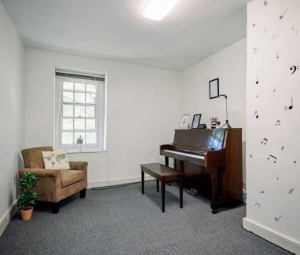- Why January Is the Perfect Time to Start Music Lessons in Downingtown PA
- How to Set Up the Perfect At-Home Studio for Virtual Music Lessons
- Online vs. In‑Person Music Lessons in Downingtown: Which Works Best for You?
- Faith and Music in Lessons at Downingtown Music Academy
- Why It’s Never Too Late to Return to Music Lessons: Stories, Tips, and Inspiration
- How Themed Practice Incentives Make Music Lessons More Fun and Effective
- Why Music is So Important for Neurodiverse Children
Should I Stop My Music Lessons for the Summer?

Summer hits and schedules get crazy. It can be tempting to think: "Should I stop my music lessons for the summer?" While it may seem like this makes sense, let’s talk about the benefits of sticking with lessons throughout the summer and how you can maintain a practice schedule when vacationing and even on the go!
1. If you keep up with lessons throughout the summer, you are less likely to notice a regression in your skills come fall.
I have said it before, and I’ll say it again-music is like learning a foreign language. What happens when we don’t practice a foreign language? We forget it. You may even practice your music over the summer, but without a teacher to track your progress, make corrections and help you advance, more often than not...skills slip. This is particularly true with kids who usually need a little extra help at home. Most parents are not “native” music speakers and don’t play instruments or sing (although I would certainly encourage them to!) so they can’t effectively help their children at home. Muscle memory also plays an important role here too. If muscles used for an instrument are not utilized, they will fall out of practice and weaken, or they may be used inappropriately, and bad habits may get picked up. Try to keep attending lessons as much as your schedule allows to avoid losing all the skills you acquired during the year. Keep in mind-you can do skype lessons too!
2. Keeping lessons up in the summer gives many people motivation to continue with their instrument.
It is easy to let your schedule fill up in the summer and lose time to practice-but schedules will always be busy. Having a teacher track your progress can be a motivating factor for at home practice too. When fall rolls around and school is in session, many times it is even harder find motivation to play because of the many new activities added to your schedule. Also, you have not seen the consistent improvement that comes will taking lessons regularly, so that can dull your interest in continuing. Combined with a regression in skills when returning to lessons in the fall, this can seriously decrease a child’s interest in lessons and lead to frustration during practice.
3. Lessons give your music education structure and routine, so it is easier when fall comes.
Many students, particularly children need routine to thrive. The transition to back to school can be overwhelming after summer. To ease this change, try maintaining some of the scheduled activities that you or your child has during the school year.
4. Music Lessons are good for your brain!
Learning an instrument, particularly with children, has been shown to be correlated with increased focus, literacy, self-regulation, spatial reasoning skills and prosocial behavior among other skills. Your child’s schoolteacher will thank you for helping to make his or her classroom a peaceful learning environment!
5. Taking lessons during the summer demonstrates to children that learning is a lifelong process and something to get excited about!
Staying curious and passionate about learning gives our lives purpose and keeps us young. It doesn’t have to be work. It can be fun, and it can be done whether the sun is shining or there is snow on the ground! Learning is a yearlong activity, and so is music.
Ways to Practice on Vacation
Road trip? In a pool? At the beach? Hiking through the Appalachian trail? You can still practice. Read on, and tune into your inner wandering minstrel…
Singer?
Try doing lip trills in the pool-just blow some bubbles in the pool water and feel your breathe release as it would for singing. Want a challenge? Try doing it on a tune like “mary had a little lamb”. You can even have family or friends guess that tune.
No piano to practice on?
Bring out your “invisible” piano. Lay your book on your lap and practice the fingering needed to play your assigned music. You can even draw a piano on a large sheet of paper. You are still practicing the coordinations necessary for your instrument. If you want to get really fancy, there are roll up pianos available for purchase on amazon. Ask your teach about one at your next lesson. This works with the “invisible” guitar too!
Do you own headphones?
Great! Lip sync or visualize the words to your assigned song and practice your breathing. Imagine the coordinations you will need to hit the notes on target with the proper tone.
More Ideas:
-Learn the lyrics to your music by reading them over and over online. -Sing along with the recorded warmups from your lesson. Voice is the ultimate portable instrument! -Listen and critique your latest lesson recordings. -Listen to other singers and instrumentalists and learn from their mistakes and what they do well. -Guitars can be taken with you as long as they are protected by a case. -Work on your music theory and read through your music to look for patterns and surprises Need some motivation? Contact us!